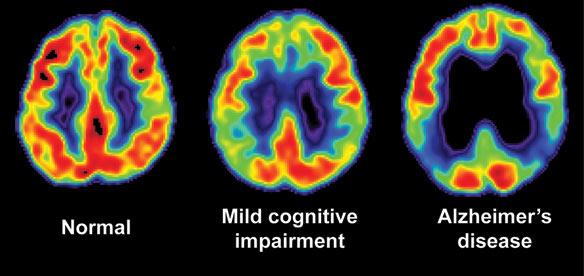There is no denying that dementia is a significant clinical problem in Canada. A news release from the Alzheimer Society of Canada in early 2009 stated that within a generation, the number of people living with Alzheimer's disease (AD) or a related dementia could reach 1.3 million, and it's not only affecting the older generations--more than 71,000 Canadians living with AD or a related dementia are under the age of 65. With statistics like these, clinical trials investigating diagnoses and treatments for AD have increased in the last few years. TRIUMF is now lending its expertise.
The University of British Columbia (UBC) and TRIUMF Positron Emission Tomography (PET) group is playing a major role in a ground-breaking new study that could significantly advance the study and management of Alzheimer's disease. The Alzheimer's Disease Neuroimaging Initiative (ADNI), originally a five-year study that began in late 2004, is now being supplemented by a new subset of studies involving 16 North American PET centres, including the UBC and TRIUMF PET group. These sub-studies will image amyloid plaque burden (extracellular deposits of protein aggregates on the brain, characteristic of AD) with PET and [C-11] Pittsburgh Compound B (PIB) in a subset of ADNI participants who are scheduled to receive [F-18]2-fluoro-deoxyglucose (FDG) PET scans.
"Originally, researchers could not demonstrate the presence of these tell-tale amyloid plaques, which would definitively diagnose a patient with AD, until the time of autopsy," explained Dr. Tom Ruth, Senior Research Scientist participating in the project at UBC and TRIUMF. "However, this Pittsburgh Compound B (PIB), a carbon-11 labeled, lipophilic derivative of thioflavin-T, has been developed as a non-invasive method used in PET scans for the direct and quantitative assessment of amyloid deposition in living subjects."
|
Figure 1: Chemical structure of Pittsburg compound B. (http://en.wikipedia.org/wiki/File:Pittsburgh_compound_B.png)
The PIB PET scans at the 16 centres are conducted in control, mild cognitive impairment (MCI), and AD subjects. MCI is a transition stage between the cognitive decline of normal aging and the more serious problems caused by Alzheimer's disease and is characterized by deficient memory, reduced performance on cognitive tests, doing things incorrectly, etc. "We're looking at patients who are showing unusual signs, but still functioning clearly in the world," said Dr. Ruth of the MCI subjects. "Then we look at whether they will progress into Alzheimer's and look for markers we can use to track that decline."
|
Figure 2: On the left is a PET scan showing normal levels of glucose metabolism, indicated in yellow and red. The levels of glucose metabolism in the brain are decreases in patients with MCI (middle) and with AD (right). (Cindee Madison and Susan Landau, UC Berkeley).
The goal of this study, then, is to determine if amyloid imaging with PIB can be a useful biomarker in MCI and AD. The development of biomarker and imaging studies that track the development and progress of AD and reflect the change in people's bodies may lead to a predictive test or effective treatment of AD, which would be extremely beneficial to people experiencing MCI. According to Dr. Ruth, if pharmaceuticals to remove amyloid plaque are developed from the research being conducted worldwide, scientists may be able to intervene at an earlier stage and slow or even halt the progression of AD.
Click here for more information about the UBC-TRIUMF PET Group.
-- Meghan Magee, Communications Assistant


